- Home
- Richard Bach
Illusions Page 7
Illusions Read online
Page 7
"OK. Part Two:"
"Part Two: Everybody else is free to do whatever they feel tike doing, for a living. Part Three: Responsible is Able to Respond, able to answer for the way we choose to live. There's only one person we have to answer to, of course, and that is . . . ?"
". . . ourselves," Don said, replying for the imaginary crowd of seekers sitting around.
"We don't even have to answer to ourselves, if e don't feel like it . . . there's nothing wrong with being irresponsible. But most of us find it more interesting to know why we act as we do, why we make our choices just so--whether we choose to watch a bird or step on an ant or work for money at something we'd rather not be doing." I winced a little. "Is that too long an answer?"
He nodded. "Way too long."
"OK. . . . How do you hope to impress the world. . ." I rolled out from under the plane and rested for a while in the shade of the wings. "How about I allow the world to live as it chooses, and I allow me to live as I choose."
He threw a happy proud smile at me. "Spoken like a true messiah! Simple, direct, quotable, and it doesn't answer the question unless somebody takes the time to think carefully about it."
"Try me some more." It was delicious, to watch my own mind work, when we did this.
"'Master,'" he said, "'I want to be loved, I'm kind, I do unto others as I would have them do unto me, but still I don't have any friends and I'm all alone.' How are you going to answer that one?"
"Beats me," I said. "I don't have the foggiest idea what to tell you."
"WHAT?"
"Just a little humor, Don, liven up the evening. A little harmless change of pacer, there."
"You'd best be plenty careful how you liven up the evenings. Problems are not jokes and games to the people who come to you, unless they are highly advanced themselves, and that sort know they're their own messiah. You are being given the answers, so speak them out. Try that 'Beats me' stuff and you'll see how fast a mob can burn a man at the stake."
I drew myself up proudly. "Seeker, thou comest to me for an answer, and unto thee I do answer: The Golden Rule doesn't work. How would you like to meet a masochist who did unto others as he would have them do unto him? Or a worshiper of the Crocodile God, who craves the honor of being thrown alive into the pit: Even the Samaritan, who started the whole thing . . . what made him think that the man he found lying at the roadside wanted to have oil poured in his wounds? What if the man was using those quiet moments to heal himself spiritually, enjoying the challenge of it?" I sounded convincing, to me.
"Even if the Rule was changed to Do unto others as they want to be done to, we can't know how anybody but ourselves wants to be done to. What the Rule means, and how we apply it honestly, is this: Do unto others as you truly feel like doing unto others. Meet a masochist with this rule and you do not have to flog him with his whip, simply because that is what he would want you to do unto him. Nor are you required to throw the worshiper to the crocodiles. ''l looked at him. "Too wordy?"
"As always. Richard, you are going to lose ninety percent of your audience unless you learn to keep it short!"
"Well, what's wrong with losing ninety percent of my audience?" I shot back at him. "What's wrong with losing ALL my audience? I know what I know and I talk what I talk! And if that's wrong then that's just too bad. The airplane rides are three dollars, cash!"
"You know what?" Shimoda stood up, brushing the hay off his blue jeans.
"What?" I said petulantly.
"You just graduated. How does it feel to be a Master?"
"Frustrating as hell."
He looked at me with an infinitesimal smile. "You get used to it," he said.
Here is
a test to find
whether your mission on earth
is finished:
If you're alive,
it isn't.
16
Hardware stores are always long places, shelves going back into forever.
In Hayward Hardware I had gone hunting back in the dim, needing three eighths-inch nuts and bolts and lock washers for the tail skid of the Fleet. Shimoda browsed patiently as I looked, since of course he didn't need anything from a hardware store. The whole economy would collapse, I thought, if everybody was like him, making whatever they wanted out of thought-forms and thin air, repairing things without parts or labor.
At last I found the half-dozen bolts I needed and journeyed with them back toward the counter, where the owner had some soft music playing. Green sleeves; it was a melody that has haunted me happily since I was a boy, played now on a lute over some hidden sound system. . . strange to find in a town of four hundred souls.
Turned out it was strange for Hayward, too, for it wasn't a sound system at all. The owner sat tilted back on his woo en stool at the counter, and listened to the messiah play the notes on a cheap six string guitar from the sale shelf. It was a lovely sound, and I stood quiet there paying my seventy-three cents and being haunted again by the tune. Perhaps it was the tinny quality of the cheap instrument, but it still sounded far misty other-century England.
"Donald, that's beautiful! I didn't know you could play the guitar!"
going to say, 'You never felt that way about guitars, did you ? "'
"You never felt that way about guitars, did you?"
"And this sinking feeling I have right now, Don, tells me that is how you learned to fly. You just got into the Travel Air one day and you flew it. Never been up in an airplane before."
"My, you are intuitive."
"You didn't take the flying test for your license? no, wait. You don't even have a license, do you? A regular flying license."
He looked at me strangely, the whisper of a smile as though I had dared him to come up with a license and he knew that he could do it.
"You mean the piece of paper, Richard? That kind of license?"
"Yes, the piece of paper."
He didn't reach into his pocket or bring out his wallet. He just opened his right hand and there was a flying license, as though he had been carrying it around, waiting for me to ask. It wasn't faded or bent, and I thought that ten seconds ago it hadn't existed at all.
But I took it and looked. It was an official pilot's certificate, Department of Transportation seal on it, Donald William Shimoda, with an Indiana address, licensed commercial pilot with ratings for single- and multi-engine land airplanes, instruments, and gliders.
"You don't have your seaplane ratings, or helicopter?"
"I'll have those if I need to have them," he said so mysteriously that I burst out laughing before he did. The man sweeping the walk of the International Harvester place looked at us and smiled, too.
"What about me?" I said. "I want my airline transport rating:'
"You're gonna have to forge your own licenses," he said.
17
On the Jeff Sykes radio talk show, I saw a Donald Shimoda I had never seen before. The show began at 9:00 p.m. and went till midnight, from a room no bigger than a watchmaker's, lined about with dials and knobs and racks of tape-cartridge commercial spots.
Sykes opened by asking if there wasn't something illegal about flying around the country in an ancient airplane, taking people for rides.
The answer is no, there is nothing illegal about it, the planes are inspected as carefully as any jet transport. They are safer and stronger than most sheet-metal modern airplanes, and all that's needed is a license and a farmer's permission. But Shimoda didn't say that. "No one can stop us from doing what we want to do, Jeff," he said.
Now that is quite true, but it had none of the tact that is called for when you are talking with a radio audience that is wondering what is going on, these airplanes flying around. A minute after he said that, the call-director telephone began lighting up on Sykes' desk.
"We have a caller on line one," Sykes said. "Go ahead, ma'am."
"Am I on the air?"
"Yes, ma'am, you are on the air and our guest is Mr. Donald Shimoda, the airplane flier. Go ahead,
you are on the air."
"Well, I'd like to tell that fellow that not everybody gets to do what they want to do and that some people have to work for their living and hold down a little more responsibility than flying around with some carnival!"
"The people who work for a living are doing what they most want to do," Shimoda said. "Just as much as the people who play for a living. . ."
"Scripture says by the sweat of thy brow shalt thou earn thy bread, and in sorrow shalt thou eat of it."
"We're free to do that, too, if we want."
"'Do your thing!' I get so tired of people like you saying do your thing, do your thing! You let everybody run wild, and they'll destroy the world. They are destroying the world right now. Look at what is happening to the green living things and the rivers and the oceans!"
She gave him fifty different openings to reply, and he ignored them all. "It's OK if the world is destroyed," he said. "There are a thousand million other worlds for us to create and choose from. As long as people want planets, there will be planets to live on."
That was hardly calculated to soothe the caller, and I looked at Shimoda, astonished. He was speaking from his viewpoint of perspectives over lots of lifetimes, learnings only a master can expect to recall. The caller was naturally assuming that the discussion had to do with the reality of this one world, birth is the beginning and death is the end. He knew that . why did he ignore it?
"Everything's OK, is it?" the caller said into her telephone." There's no evil in this world, no sin going on all around us ? That doesn't bother you, does it?
"Nothing there to be bothered about, ma'am. We see just one little fleck of the whole that is life, and that one fleck is fake. Everything balances, and nobody suffers and nobody dies without their consent. Nobody does what they don't want to do. There is no good and there is no evil, outside of what makes us happy and what makes us unhappy."
None of it was making the lady on the phone any calmer. But she broke suddenly and said simply, "How do you know all these things that you say? How do you know what you say is true?"
"I don't know they're true," he said. "I believe them because it's fun to believe them."
I narrowed my eyes. He could have said that he had tried it and it works . . . the healing, the miracles, the practical living that made his thinking true and workable. But he didn't say that. Why?
There was a reason. I held my eyes barely open, most of the room gray, just a blurred fuzzy image of Shimoda leaning to talk into the microphone. He was saying all these things straight out, offering no choices, making no effort to help the poor listeners understand.
"Anybody who's ever mattered, anybody who's ever been happy, anybody who's ever given any gift into the world has been a divinely selfish soul, living for his own best interest. No exceptions,"
It was a male caller next, while the evening fled by. "Selfish! Mister, do you know what the antichrist is?"
For a second Shimoda smiled and relaxed in his chair. It was as if he knew the caller personally.
"Perhaps you could tell me," he said.
"Christ said that we have to live for our fellow man. Antichrist say be selfish, live for yourself and let other people go to hell."
"Or heaven, or wherever else they feel like going."
"You are dangerous, do you know that, mister? What if everybody listened to you and did just whatever they felt like doing? What do you think would happen then?"
"I think that this would probably be the happiest planet in this part of the galaxy," he said.
"Mister, I am not sure that I want my children to hear what you are saying."
"What is it that your children want to hear?"
"If we are all free to do whatever we want to do then I'm free to come out in that field with my shotgun and blow your fool head off."
"Of course you're free to do that."
There was a heavy click on the line. Somewhere in town there was at least one angry man. The others, and the angry women too, were on the telephone; every button on the machine was lit and flashing.
It didn't have to go that way; he could have said the same things differently and ruffled no feathers at all.
Sifting, sifting back over me was the same feeling I had in Troy, when the crowd broke and surrounded him. It was time, it was clearly time for us to be moving along. The handbook was no help, there in the studio.
In order
to live free and happily,
you must sacrifice
boredom.
It is not always an easy
sacrifice.
Jeff Sykes had told everybody who we were, that our airplanes were parked on John Thomas' hayfield on State 41, and that we slept nights under the wing.
I felt these waves of anger, from people frightened for their children's morality, and for the future of the American way of life, and none of it made me too happy. There was a half hour left of the show, and it only got worse.
"You know, mister, I think you're a fake," said the next caller.
"Of course I'm a fake! We're all fakes on this whole world we're all pretending to be something that we're not. We are not bodies walking around, we are not atoms and molecules, we are unkillable undestroyable ideas of the Is, no matter how much we believe otherwise . . ."
He would have been the first to remind me that I was free to leave, if I didn't like what he was saying, and he would have laughed at my fears of lynch mobs waiting with torches at the airplanes.
18
Don't be
dismayed at good-byes.
A farewell is necessary before
you can meet
again.
And meeting
again, after moments or
lifetimes, is certain for
those who are
friends.
Next noon, before the people came to fly, he stopped by my wing. "Remember what you said when you found my problem, that nobody would listen, no matter how many miracles I did?"
"No."
"Do you remember that time, Richard?"
"Yeah, I remember the time. You looked so lonely all of a sudden. I don't remember what I said."
"You said that depending on people to care about what I say is depending on somebody else for my happiness. That's what I came here to learn: it doesn't matter whether I communicate or not. I chose this whole lifetime to share with anybody the way the world is put together, and I might as well have chosen it to say nothing at all. The Is doesn't need me to tell anybody how it works."
"That's obvious, Don. I could have told you that."
"Thanks a lot. I find the one idea I lived this life to find, I finish a whole life's work, and he says, 'That's obvious, Don. "'
He was laughing, but he was sad, too, and at the time I couldn't tell why.
19
The mark
of your ignorance is the depth
of your belief in injustice
And tragedy.
What the caterpillar
calls the end of the world,
the master calls a
butterfly.
The words in the Handbook the day before were the only warning I had. One second there was the normal little crowd waiting to fly, his airplane taxiing in, stopping by them in a whirl of propeller-wind, a casual good scene for me from the top wing of the Fleet as I poured gas into the tank. The next second there was a sound like a tire exploding and the crowd itself exploded and ran. The tire on the Travel Air was untouched, the engine ticked over at idle as it had a moment before, but there was a foot-wide hole in the fabric under the pilot's cockpit and Shimoda was pressed to the other side, head slammed down, his body still as sudden death.
It took a few thousandths of a second for me to realize that Donald Shimoda had been shot, another to drop the gas can and jump off the top wing, running. It was like some movie script, some amateur-acted play, a man with a shotgun running away with everybody else, close enough by me I could have cut him with a saber. I remem
ber now that I didn't care about him. I was not enraged or shocked or horrified. The only thing that mattered was to get to the cockpit of the Travel Air as fast as I could and to talk with my friend.
It looked as if he had been hit by a bomb; the left half of his body was all torn leather and cloth and meat and blood, a soggy mass of scarlet.
His head was tilted down by the fuel primer knob, at the right lower corner of the instrument panel, and I thought that if he had been wearing his shoulder harness he wouldn't have been thrown forward like that.
"Don! Are you OK?" Fool's words.
He opened his eyes and smiled. His own blood was sprayed wet across his face "Richard, what does it look like?"
I was enormously relieved to hear him talk. If he could talk, if he could think, he would be all right.
"Well, if I didn't know better, buddy, I'd say you had a bit of a problem."
He didn't move, except just his head a little bit, and suddenly I was scared again, more by his stillness than by the mess and the blood. "I didn't think you had enemies."
"I don't. That was . . . a friend. Better not to have . . . some hater bring all sorts of trouble . . . into his life . . . murdering me."
The seat and side panels of the cockpit were running with blood-it would be a big job just to get the Travel Air clean again, although the airplane itself wasn't damaged badly. "Did this have to happen, Don ?"
"No . . ." he said faintly, barely breathing. "But I think . . . I like the drama . . ."
"Well, let's get cracking! Heal yourself! With the crowd that's coming, we got lots of flying to do!"
But as I was joking at him, and in spite of all his knowing and all his understanding of reality, my friend Donald Shimoda fell the last inch to the primer knob, and died.
There was a roaring in my ears, the world tilted, and I slid down the side of the torn fuselage into the wet red grass. It felt as if the weight of the Handbook in my pocket toppled me to my side, and as I hit the ground it fell loose, wind slowly ruffling the pages.

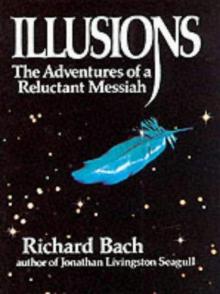 Illusions: The Adventures of a Reluctant Messiah
Illusions: The Adventures of a Reluctant Messiah Biplane
Biplane Stranger to the Ground
Stranger to the Ground A Gift of Wings
A Gift of Wings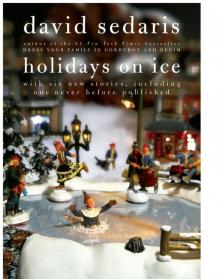 Holidays on Ice
Holidays on Ice Hypnotizing Maria: A Story
Hypnotizing Maria: A Story Jonathan Livingston Seagull
Jonathan Livingston Seagull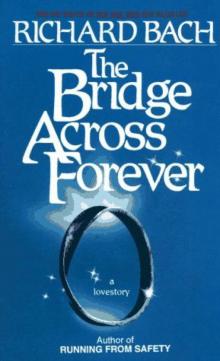 The Bridge Across Forever: A True Love Story
The Bridge Across Forever: A True Love Story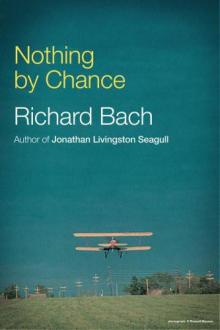 Nothing by Chance
Nothing by Chance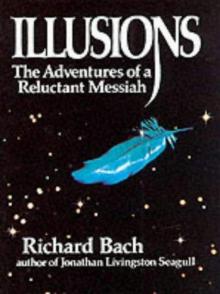 Illusions
Illusions Jonathan Livingston Seagull: The New Complete Edition
Jonathan Livingston Seagull: The New Complete Edition Hypnotizing Maria
Hypnotizing Maria Illusions II: The Adventures of a Reluctant Student (Kindle Single)
Illusions II: The Adventures of a Reluctant Student (Kindle Single)